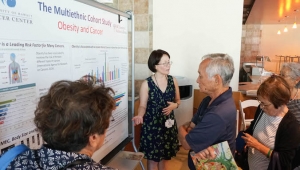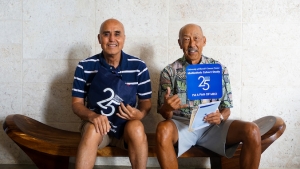A possible key to high incidence of type-2 diabetes among Japanese Americans has been uncovered using data from the most ethnically diverse and longstanding study in the world, the University of Hawaiʻi Cancer Center’s Multiethnic Cohort (MEC) Study. The development of type-2 diabetes has been linked to visceral adipose tissue (VAT) or intra-abdominal fat, particularly in Japanese Americans with ectopic adipose tissue (EAT), excess fat in locations that are not commonly associated with fat storage. This recent finding is one of hundreds informed by data from the MEC since its launch in 1993.
A publication highlighted this new research, noting in many ethnic groups, obesity is often associated with type-2 diabetes. Conversely, Japanese Americans have relatively low body mass index levels but tend to have higher levels of VAT and EAT. This results in less testing than ethnic groups with higher obesity rates, which may be a factor in the high incidence among Japanese Americans.
Findings from this study can help to improve early detection and prevention strategies for type-2 diabetes. Diet and exercise can play an important role in preventing the onset of diabetes. Individuals should consult with their doctor for more information.
The MEC Study

The state of Hawaiʻi is known for being one of the most ethnically diverse locations in the nation, making the UH Cancer Center a unique hub for cancer research. In order to best serve Hawaiʻi’s population, epidemiologists at the Cancer Research Center of Hawaiʻi, now known as the UH Cancer Center, established the MEC Study in 1993. Over the years, the study has provided many advances in understanding differences in cancer risk that exist among racial/ ethnic groups. Its findings have had a significant impact on identifying ways to prevent cancer.
The MEC Study is a large epidemiological study which has followed 215,000 residents of Hawaiʻi and Los Angeles, aged 45 to 75 years since the start of the study, for the development of cancer and other chronic diseases. It includes men and women of five main ethnic groups: Japanese Americans, Native Hawaiians, African Americans, Latinos and Whites. The study was initiated by Laurence Kolonel, at the Cancer Research Center of Hawaiʻi, and Brian Henderson at the University of Southern California Norris Comprehensive Cancer Center.
Ronald Cambra, a MEC Study participant since 1993, recently retired as UH Mānoa vice chancellor for undergraduate education after dedicating more than 40 years of service to the university. He is one of the many residents throughout Hawaiʻi and Los Angeles who have made generous contributions of their time and information that have led to life-changing and life-saving cancer discoveries.
“I am extremely proud to be a member of the MEC,” said Cambra. “Recently, I spent time reading some of the conclusions drawn from this work. I am more convinced than ever that every second of my time dedicated to this task has resulted in knowledge that will save lives and speed up our understanding and focus in finding the best approaches for battling each cancer and ultimately a cure.”
Scientific contributions

The MEC Study has gained national and international recognition among biomedical scientists because it is the most ethnically diverse and long standing longitudinal cohort study in the world.
The MEC has generated more than 800 scientific publications. These have focused on the role of alcohol, coffee, diet quality, meat-cooking methods, dietary supplements, body fat distribution, physical activity, reproductive factors, hormones, inflammation, diabetes, air pollution, gut microbiome, genetics and more, in determining a person’s risk for cancer and other diseases. Findings from the MEC Study have been used nationally to formulate general population guidelines for diet and nutrition, cancer screening and cancer risk reduction.
MEC Discoveries
- Coffee may help you live longer.
- Diet relates to lower risk of colorectal cancer.
- Processed and grilled meats are linked to cancer.
- Alcohol consumption increases breast cancer risk.
- Risk of cancers due to obesity varies among ethnic groups.
View other MEC-related studies.
The UH Cancer Center is celebrating its 50th anniversary in 2021. Look for more stories throughout the year as it reflects on 50 years of progress and looks toward the next 50 years to bring forth even more innovations in research and cancer care.
This is an example of UH Mānoa’s goal of Excellence in Research: Advancing the Research and Creative Work Enterprise (PDF), one of four goals identified in the 2015&@8211;25 Strategic Plan (PDF), updated in December 2020.

